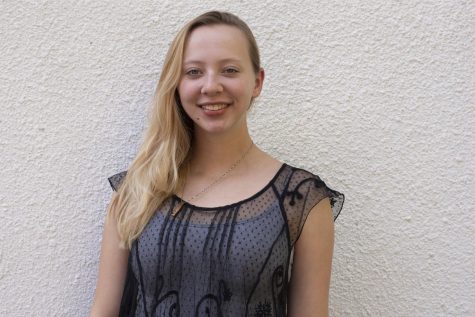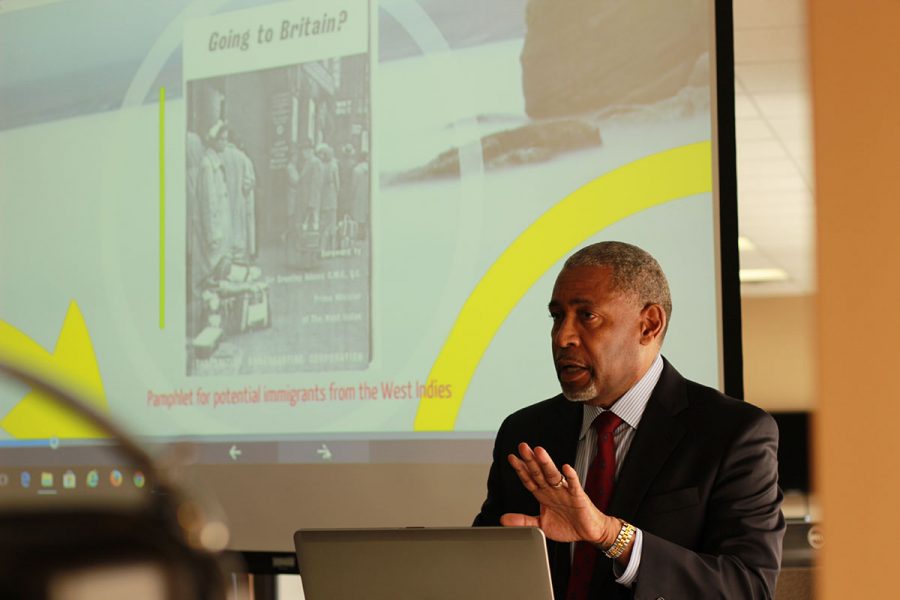This semester’s faculty forum series concludes with a discussion about racism in 1950’s Britain
Darrell Newton discusses his research of BBC’s 1958 “Going to Britain?” booklet
Photo by Gabbie Henn
Darrell Newton visited England 32 times in order to explore the history behind the “Going to Britain?” booklet.
This semester’s final Faculty/Academic Staff Forum, on Wednesday, featured Dr. Darrell Newton, Associate Vice Chancellor of Academic Affairs and Dean of Graduate Studies. After beginning his research in 1992, Newton published his findings on how the British Broadcasting Channel’s (BBC) policies and procedures have changed since the 1950s in his book titled Paving the Empire Road: BBC Television and Black Britons (2011).
During the early 1950s, there was an influx of West Indian immigrants entering England. At first, British citizens welcomed the immigrants, believing that they were there to “serve the motherland.” Eventually, tensions began to rise between the two peoples as competition for jobs and general prejudices became more apparent. The BBC, a worldwide broadcasting network at the time, then developed programming that addressed the racial differences between West Indians and the British.
In 1958, the BBC released a booklet titled “Going to Britain?” Though this booklet was framed as a sort of travel guide, it actually served as a means of discouraging and dissuading West Indians from coming to Britain. The booklet painted Britain as a sort of dystopia, describing disease, poor weather, and economic hardships. It informed the potential West Indian immigrants that coming to Britain would mean they would have to “tolerate racism,” as it will simply be a part of life.
Newton came across “Going to Britain?” while working on his dissertation. He said the more he learned about it, the more questions he had, eventually leading to the publication of his novel.
Newton said it is important to learn about situations like this, because it can help to prevent people from repeating those mistakes in the future. Event today, Newton said there are still mistakes being made when it comes to immigration.
“It’s amazing how certain issues regarding immigration are still topical,” Newton said. “In the work that I’ve done, I can’t help but to notice how often various people in our country are ‘othered’ by some imagined norm. Whether we imagine ourselves as Americans, imagine ourselves as white, or imagine ourselves as blue, or red, or upper-class, or lower-class — we then turn our backs on others unlike us, as opposed to reaching out to them to learn from them.”
Newton said the more people learn from people who are not like them, the more people will begin to realize that we are all “more alike than unalike.” He encourages people to really speak with one-another, to ask questions, and to take these new points-of-view to heart.
“To have a conversation with one person unlike you is worth 50 hours worth of viewing your favorite TV show, your favorite news program, that simply reinforces what you believe to be true.”
Amanda Zastrow, a third-year graduate assistant and English major, works a graduate assistant in the Office of Research and Sponsored Programs (ORSP). The ORSP sponsors the faculty forums, which happen eight to nine times a semester. Zastrow’s role in the ORSP is to contact the potential speakers, and to film each forum.
Zastrow said that she found Newton’s presentation to be really interesting, as some of the issues addressed are not “old issues.”
“These are things that are still going on,” Zastrow said. “So it’s important that people are aware that it’s not over. I think that sometimes people forget that if it’s not directly facing them in the moment.
The next Faculty Forum series will kick off during the second week of the fall semester. Zastrow said that she would recommend the program to more students, as it is open to everyone and the ORSP likes to see a wider demographic of audience members.
“I’m deeply proud of (this) generation of students coming up now, because you guys are questioning authority, you are questioning the messages that you’re receiving, you’re asking really intelligent questions, and you’re getting very, very tired of the status quo,” Newton said. “Every generation has stepped up to kind of fight back against the power — so to speak — but you guys are doing it in a way that’s even more appreciable.”

Madeline Fuerstenberg is a fourth-year journalism student. This is her eighth semester on The Spectator staff and she’ll miss it with all her heart once she graduates (if she graduates).

